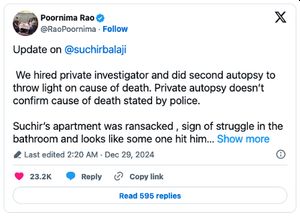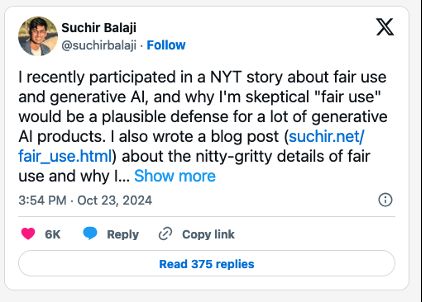- within Technology topic(s)
- in United States
- with readers working within the Media & Information and Construction & Engineering industries
- with readers working within the Oil & Gas and Securities & Investment industries
- within Technology, Law Department Performance, Food, Drugs, Healthcare and Life Sciences topic(s)
- in United States
Mysterious Death of Suchir Balaji Raises Questions
This past November, 26-year old OpenAI whistleblower Suchir Balaji was found dead in his apartment in San Francisco. While the San Francisco Medical Examiner declared the death a suicide, Balaji's parents have questioned that ruling, claiming foul play. The Balajis hired a private investigator and ordered an independent autopsy to further investigate the death. In recent days, Balaji's mother took to social media claiming, "Private autopsy doesn't confirm the cause of death stated by police."

Alleged Evidence of Foul Play
In addition to reporting evidence of "head injury" in the private autopsy they ordered, the parents claim Balaji's apartment was "ransacked," there were signs of a struggle—and blood—in his bathroom, and no suicide note was found. More recently, Balaji's parents have requested an FBI Investigation into the matter, stating that the local authorities lack the ability to thoroughly investigate a case that includes cybersecurity and whistleblower protection. San Francisco police report the case remains "open and active."
Who Was Suchir Balaji?
Balaji, a former OpenAI intern, and then full-time researcher, was with the company for four years before quitting in August 2024. He was quoted as saying "If you believe what I believe, you have to just leave the company." His work was instrumental in the development of a number of OpenAI's products, including ChatGPT, as noted by OpenAI co-founder John Schulman, who acknowledged "Suchir's contributions to this project were essential and it wouldn't have succeeded without him."
Whistleblower Allegations Against OpenAI
Suchir's death came only three months after he publicly reported that OpenAI violated U.S. copyright law while developing ChatGPT. He later participated in a whistleblowing interview with the New York Times in October 2024 and posted his own blogs about his experience developing ChatGPT and why he believed OpenAI had violated copyright laws.

Balaji's Concerns Over Copyright Infringement
In his blog posts, Balaji reported that he worked on ChatGPT in his last 18 months at OpenAI and that he initially believed the project was purely for research purposes, not for profit. He blogged that at first he had little knowledge or understanding of copyright law, but "became curious after seeing all the lawsuits filed against GenAI companies." Upon further investigation, he concluded that "fair use seems like a pretty implausible defense for a lot of generative AI products, for the basic reason that they can create substitutes that compete with the data they're trained on."
Balaji's Role in Pending Copyright Lawsuits
Given his admissions, Balaji was listed as a "person with knowledge" in the Author's Guild and New York Times lawsuits pending against OpenAI and had expressed that he intended to testify. Since first requesting FBI involvement, his parents report that Balaji was gathering evidence and preparing to "go public in a big way," including potentially even bringing his own legal action against OpenAI.
Suspicious Activity on Balaji's Devices
The family also report unusual activity on Balaji's devices after his death, including temporary files from Google Chrome and Google Drive on November 29 – two days after his death—and have further noted that a device reportedly containing "sensitive information" related to the lawsuits pending against OpenAI is missing from the apartment.
OpenAI and the Copyright Lawsuits
OpenAI is one of the largest players in the generative AI industry, valued at $157 Billion, and its ChatGPT product is one of the most widely used AI products in the world. The many lawsuits pending against OpenAI, including suits brought by Elon Musk, the Author's Guild, and the New York Times, raise questions as to the legality of how OpenAI accesses information and then uses that information to train its large language model machine-leaning programs like ChatGPT. Since Balaji was not deposed in any other those lawsuits prior to his death, it remains unclear whether and to what extent his revelations will be allowed as evidence in the pending suits.
Potential Legal Arguments for and Against Admitting Balaji's Statements
The outcome will obviously depend on the arguments of counsel and it will be interesting to see what approach they take to try and get the information admitted. Given his unavailability, counsel for OpenAI is certain to argue for the exclusion of the evidence as hearsay—an out of court statement, offered for the truth of the matter asserted, and on which the speaker is not available for cross-examination.
At first blush, it would appear that perhaps this is an admission by party opponent, except that Balaji was no longer employed by OpenAI at the time of his initial comments and certainly would not have been their employee by the time these matters go to trial. The plaintiffs' attorneys could potentially argue present sense impression, asserting that the interview and blog post happened shortly after Balaji's discovery of OpenAI's infringement and his resignation from the company for that reason.
The Residual Hearsay Exception Argument
Another possibility is arguing the admission of the evidence under the residual hearsay exception of Federal Rule of Evidence 807, which provides that even if the information is hearsay, it is not excluded if "the statement is supported by sufficient guarantees of trustworthiness—after considering the totality of the circumstances under which it was made and the evidence, if any, corroborating the statement; and it is more probative on the point for which it is offered than any other evidence that the proponent can obtain through reasonable efforts." Given Balaji's insider status at the time of the alleged infringement, there is no doubt his information is relevant and highly probative to the cases, but whether the plaintiffs' attorneys can satisfy the other parameters of the residual hearsay exception will depend on the totality of the evidence.
Ongoing Investigation and Future Developments
The only certainty in this matter at this date is that it will continue to garner attention—regarding the ongoing investigation of the local authorities in San Francisco, as to whether the FBI or other investigative agency gets involved, and any final determination on the cause of death. Also of "front-page" interest will be the extent to which the information supplied by Balaji—in his New York Times interview and his personal blog and any documents he may have obtained—is allowed as evidence in the pending lawsuits, if at all.
The content of this article is intended to provide a general guide to the subject matter. Specialist advice should be sought about your specific circumstances.

